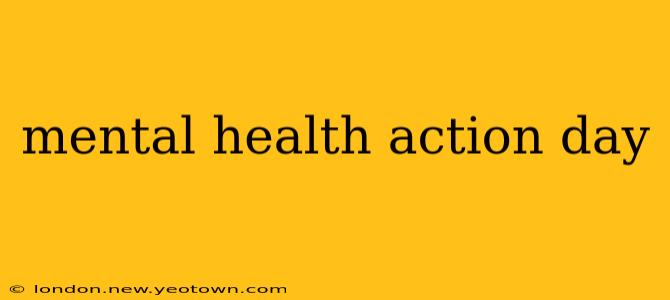October 10th marks Mental Health Action Day, a day dedicated to not just raising awareness, but to inspiring action. It's not about passively acknowledging a problem; it's about actively participating in the solution. It's a day to check in with yourself, your loved ones, and your community, and to understand how we can all contribute to a world where mental wellbeing is prioritized.
This isn't a fleeting moment; it's a catalyst for ongoing commitment. Think of it as the starting point on a long, important journey toward a more compassionate and supportive society. My journey began years ago, witnessing firsthand the struggles of friends and family members grappling with mental health challenges. This experience fueled my passion to learn more, to advocate, and to share what I've learned with others. I hope that sharing my experiences and knowledge will inspire you to take action, too.
What is Mental Health Action Day?
Mental Health Action Day isn't just another day on the calendar. It's a global movement, a collective effort to destigmatize mental health, promote wellbeing, and empower individuals to seek help when needed. It's a day dedicated to fostering open conversations, breaking down barriers, and building a support system for those who need it most.
The day encourages individuals, organizations, and communities to take concrete steps towards improving mental health, from small personal acts of kindness to large-scale initiatives aimed at systemic change.
How Can I Participate in Mental Health Action Day?
This isn't a passive observance; it's a call to action. Here are some ways you can participate:
What are some simple ways to support someone struggling with their mental health?
Supporting someone struggling with their mental health starts with listening, understanding, and offering unconditional support. Simple acts of kindness can make a world of difference. This might include offering to listen without judgment, encouraging them to seek professional help, or simply being present. Avoid offering unsolicited advice; instead, focus on validating their feelings and letting them know they're not alone.
Remember, your role is to be supportive, not to fix their problems. Sometimes, just offering a kind ear and a reassuring presence can be the most powerful act of support you can offer.
What are some signs someone might need mental health support?
Recognizing the signs of mental health struggles is crucial. These signs can vary widely from person to person, but common indicators might include persistent sadness or low mood, significant changes in behavior or sleep patterns, difficulty concentrating, loss of interest in activities once enjoyed, feelings of hopelessness or worthlessness, and social withdrawal. If you notice these signs in someone you care about, reach out and encourage them to seek professional help. It's important to remember that seeking help is a sign of strength, not weakness.
What are some resources available to help someone struggling with mental health?
Numerous resources are available to support individuals struggling with their mental health. These include helplines, online support groups, mental health professionals (therapists, psychiatrists, counselors), and community-based organizations. Many online resources offer confidential support and information. Your family doctor is also an excellent first point of contact, as they can provide referrals and guidance. Remember to research options carefully and find a resource that fits the individual's needs and preferences.
What can I do to improve my own mental wellbeing?
Prioritizing your own mental wellbeing is just as important as supporting others. This involves self-care practices, such as engaging in regular physical activity, maintaining a healthy diet, getting enough sleep, practicing mindfulness or meditation, and setting aside time for activities you enjoy. Building strong social connections, setting boundaries, and learning healthy coping mechanisms are all vital components of maintaining good mental health.
Beyond October 10th: A Commitment to Ongoing Action
Mental Health Action Day is a powerful reminder of the importance of mental wellbeing. It’s a starting point, a day to ignite conversations and initiate changes. But the impact of this day shouldn't be limited to a single day. Let's carry the spirit of this day forward, continuing to support each other, advocate for change, and build a more mentally healthy world, one day, one action, at a time.

